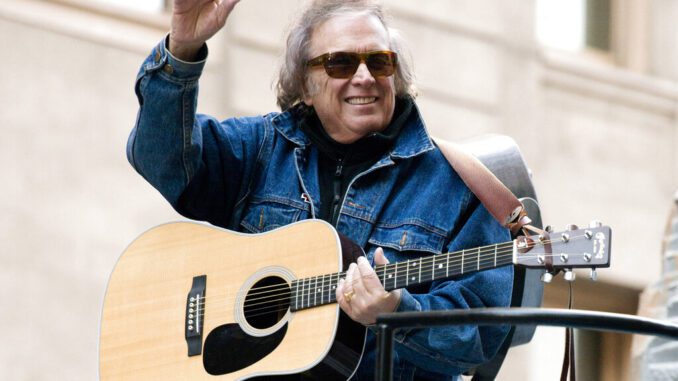
NEW YORK — Don McLean has listened for decades as people belted out his classic song “American Pie” at last call or at karaoke — and applauds you for the effort.
“I’ve heard whole bars burst into this song when I’ve been across the room,” McLean tells The Associated Press from a tour bus heading to Des Moines, Iowa. “And they’re so happy singing it that I realized, ‘You don’t really have to worry about how well you sing this song anymore. Even sung badly, people are really happy with it.'”
Happy might be a bit of an understatement. “American Pie” is considered a masterpiece, voted among the top five Songs of the Century compiled by the Recording Industry Association of America and the National Endowment for the Arts.
McLean — and his singular tune about “the day the music died” — are now the subject of a full-length feature documentary, “The Day the Music Died: The Story of Don McLean’s ‘American Pie,'” airing Tuesday on Paramount+.
It’s mandatory viewing for McLean fans or anyone who has marveled at his sonic treasure. It also represents an elegant film blueprint for future deep dives into a song and its wider cultural relevance.
For those fans who have wondered about the lyrics they are singing loudly in bars and cars, McLean shares the secrets. “That was the fun of writing the song,” he tells the AP. “I was up at night, smiling and thinking about what I’m going to do with this.”
The documentary starts when a single-engine plane carrying Buddy Holly, Ritchie Valens and Jiles P. Richardson, the “Big Bopper,” plunged into a cornfield north of Clear Lake, Iowa, on Feb. 3, 1959, killing the three stars and their pilot.
McLean was 13, living in a suburban, middle class home in New Rochelle, New York, when the crash occurred. He had bronchial asthma, prompting the description of him in “American Pie” as “a lonely teenage broncin’ buck.” The “sacred store” he sings about was the House of Music on Main Street, where he bought records and his first guitar.
Young McLean was a paperboy — “every paper I’d deliver” — and adored Elvis, Gene Vincent, Bo Diddley but especially Holly, whose death deeply affected him. “I was in absolute shock. I may have actually cried,” he says in the film. “You can’t intellectualize it. It hurt me.”
Years later, McLean would plumb that pain in “American Pie,” baking in his own grief at his father’s passing and writing a eulogy for the American dream. He was creating his second album in 1971 while the nation was racked by assassinations, anti-war protests and civil right marches. He thought he “needed a big song about America.” The first verse and melody seemed to just tumble out. “A long, long, time ago…”
It climaxed in the huge sing-along-chorus: “We were singin’, ‘Bye-bye, Miss American pie’/Drove my Chevy to the levee, but the levee was dry/Them good old boys were drinkin’ whiskey ‘n rye/And singin’, “This’ll be the day that I die.”
“I said, ‘Wow, that is something. I don’t know what it is, but it’s exactly what I’ve been wanting to try to get ahold of — that feeling about Buddy Holly — for all these years and that plane crash,” said McLean. “I always feel a tug inside me whenever I think about Buddy.”
The 90-minute documentary incorporates news footage of the ’70s and uses actors in recreations. Cameras capture McLean visiting the hallowed Surf Ballroom in Clear Lake, the last place Holly and his fellow musicians played before their fatal flight in 1959.
There are interviews with musicians — Garth Brooks, “Weird Al” Yankovich and Brian Wilson, among them — as well as Valens’ sister, Connie, and actor Peter Gallagher, whose character’s death on “Zoey’s Extraordinary Playlist” promoted an onscreen performance of “American Pie.” The British singer Jade Bird, Cuban-born producer Rudy Perez and Spanish-language singer Jencarlos Canela speak to how the song has resonated far past America.
The documentary reveals that recording the album was not exactly a smooth process. Producer Ed Freeman was unimpressed with McLean’s clutch of songs and didn’t think McLean was up to playing rhythm guitar on “American Pie.” He eventually relented.
McLean — along with a few session musicians — rehearsed for two weeks without nailing the song, getting increasingly frustrated. The addition of pianist Paul Griffin at the last minute was a “Hail Mary” stroke of genius that made the whole tune click.
For McLean, the song is a blueprint of his mind at the time and a homage to his musical influences, but also a roadmap for future students of history:
“If it starts young people thinking about Buddy Holly, about rock ‘n’ roll and that music, and then it teaches them maybe about what else happened in the country, maybe look at a little history, maybe ask why John Kennedy was shot and who did it, maybe ask why all our leaders were shot in the 1960s and who did it, maybe start to look at war and the stupidity of it — if that can happen, then the song really is serving a wonderful purpose and a positive purpose.”



